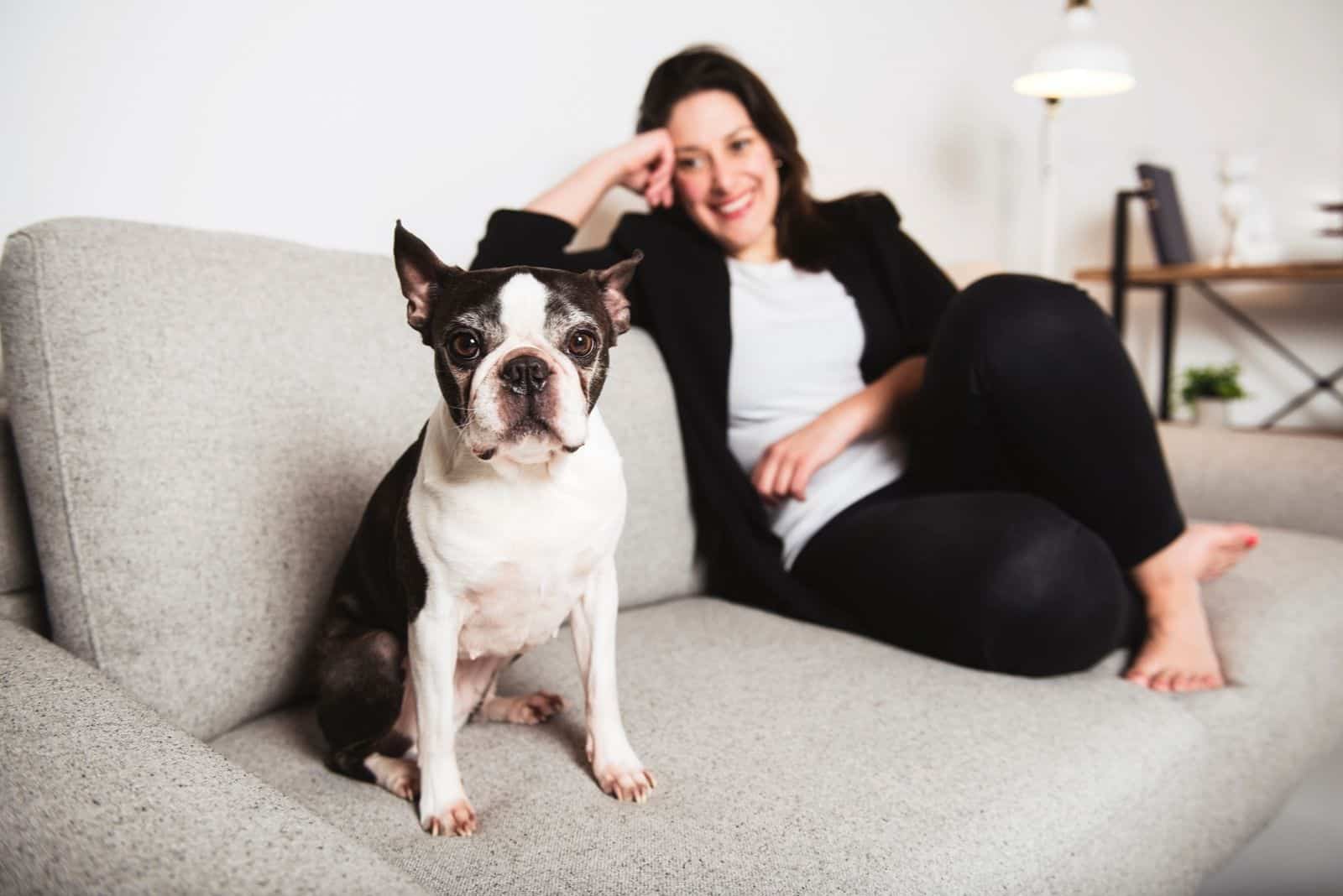Are Boston Terriers hypoallergenic? The simple answer is: no, they are not considered to be a hypoallergenic breed!
However, as with most things in life, it is more complicated than this. We need to understand what we mean when we refer to a hypoallergenic dog.
We must be clear about what the term hypoallergenic actually means. While these questions may not be important or relevant to some dog owners, there are millions of allergy sufferers who will be keen to know the answer.
Allergies are no joke. They cause misery for so many people, with allergic reactions ranging from mild to severe. In some cases, the body goes into anaphylactic shock, which can be fatal.
While this kind of reaction to dogs is rare, people who love dogs still need to know how likely it is that their pooch will cause them allergy problems.
Different dog breeds have earned a reputation for being better or worse for allergy sufferers, with the Poodle and any of its hybrids often being cited as the perfect, allergy-free dog.
As we shall see, this isn’t entirely accurate, and there is a lot of confusion surrounding this subject.
We’re going to shed some light on this issue to give a clearer picture of why dog allergies happen and give a full and honest answer to the question, Are Boston Terriers hypoallergenic?
The American Gentleman
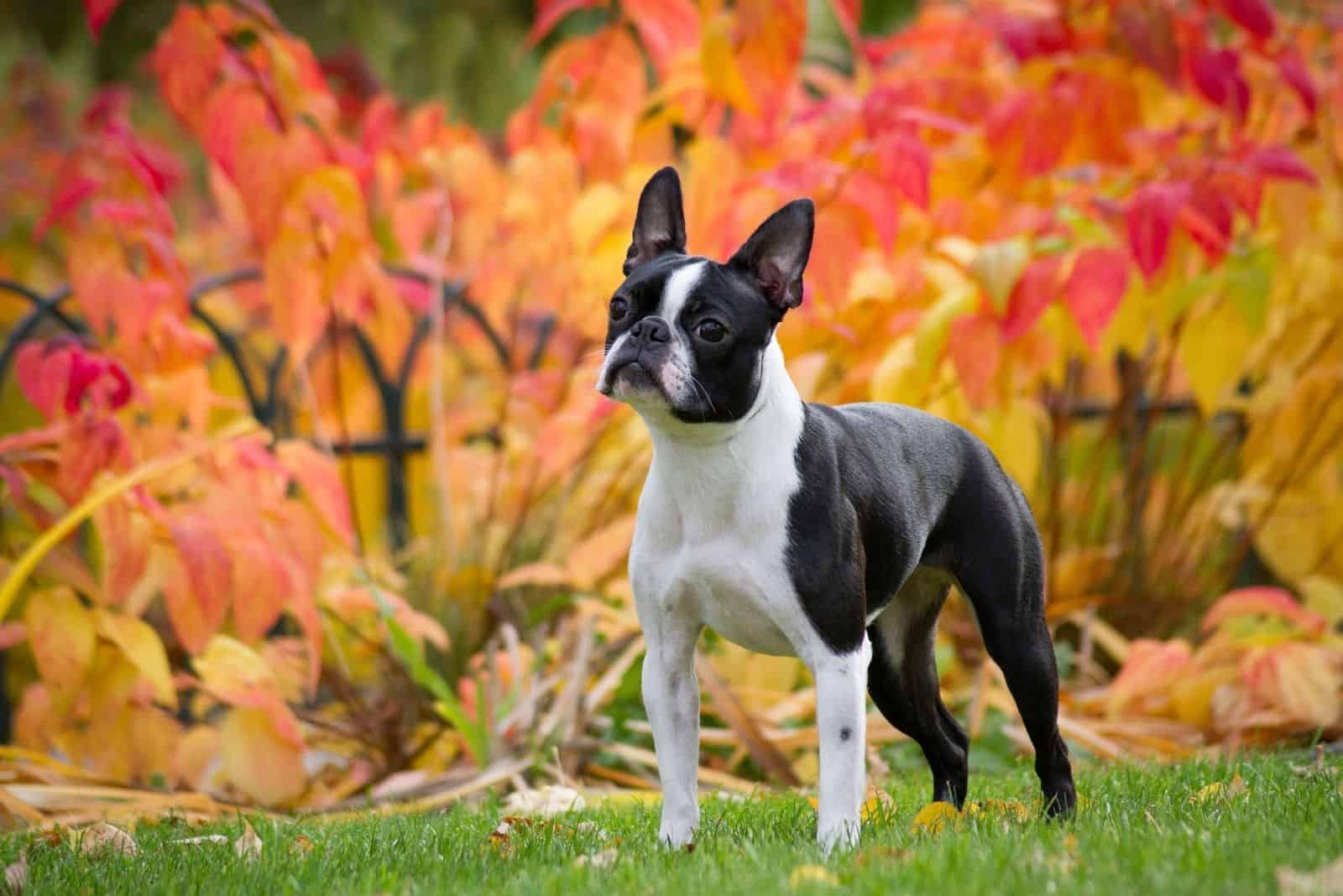
Let’s start with the breed in question, the Boston Terrier, also known as the Boston Bull Terrier.
Their friendly and calm nature has earned them the nickname of the American Gentleman. These small dogs are a true American breed and the pride of the city of Boston, although their roots lie in 19th century England where blood sports were popular.
In terms of ancestry, they are related to the English Bulldog and the English White Terrier (now extinct). They even have a little of the French Bulldog in them, which seems obvious when you look at that cute little face!
Thankfully, they escaped their violent past to become listed in the ‘non-sporting group’ by the American Kennel Club (AKC). They are excellent companion dogs that crave human company.
Their small size makes them suitable for most homes, including urban settings. They get on well with children and animals, as long as they have been socialized and trained properly. Care should be taken if young kids are around as these dogs can be boisterous.
Training shouldn’t be too much of a problem as they are an intelligent breed, but they can be strong-willed at times. However, they are quick learners who like to please you, which makes house training much easier.
There’s nothing they love so much as agility training and mental stimulation. This will keep them happy and stop them from becoming bored.
Each dog is an individual, and different characters tend to shine through. You might get one that likes to act the clown at times, whereas others will be more dignified and calm. Either way, they are affectionate, warm-hearted, and smart.
In terms of size, they stand between 15–17 in (38.1–43.18 cm) at the shoulder and weigh between 12–25 lbs (5.44–11.33 kg).
They have sleek short coats that shed infrequently and need weekly brushing. What about Boston Terrier coat colors? Their coats have a ‘tuxedo’ appearance, in brindle and white, black and white, and seal (a deep gray color, like a wet seal!) and white.
Now that we have an idea of what this charming dog is like, we’ll take a closer look at its coat to see what the fuss is about.
Do Boston Terriers Shed?
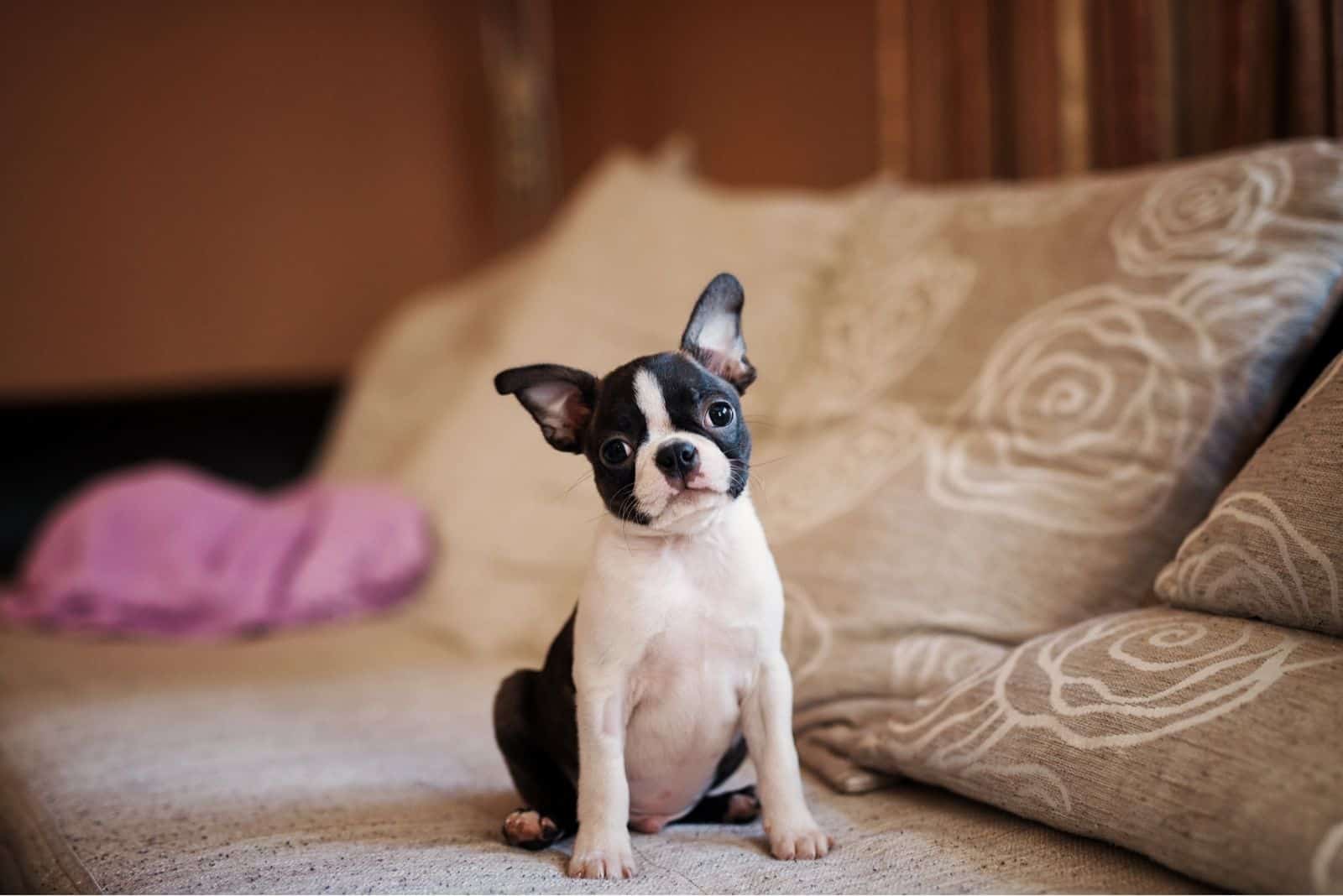
As we already mentioned, they do shed, but not much. Nowhere near as much as, say, a German Shepherd or a Labrador.
This might seem confusing to some people, as low-shedding dogs are often promoted as being the best for allergy sufferers. The problem is that most people misunderstand the meaning of the word hypoallergenic, as well as the causes of pet allergies.
First of all, every dog will shed at some point. That’s just biology. Some will shed more in spring and fall as they grow their winter or summer coats, and some will shed all year round on top of this.
Dog hairs have a four-stage life cycle, with the last stage being when the loose, dead hair falls out. As the Boston Terrier has a short, thin coat, these hairs fall out easily.
This also means that it is easy to look after, but the hairs, when they do fall out, will get stuck to your furniture and your clothes if you don’t keep it under control using a brush or grooming mitt.
Even so, it isn’t the hair itself that causes an allergic reaction. This is a common misunderstanding and the main reason behind all the confusion.
Instead, it is allergens in the form of proteins that stick to the hairs and dander (dry skin flakes) that cause the problem. The proteins that cause the allergic reaction are found in dog saliva and urine that have made their way onto the skin and fur.
What Is A Hypoallergenic Dog?

There’s no easy answer to this, so bear with us!
It is generally accepted that a hypoallergenic dog is one that is safe for allergy sufferers, mostly because it is low or non-shedding. However, this is incorrect. As we have learned, the Boston Terrier is a low-shedder but is not considered hypoallergenic.
Recent research has shown that all dogs shed to some degree and that allergies aren’t caused by the hairs themselves.
Poodles are very low shedders, and their loose hair sticks within the curls of their fluffy coats, making it easier to gather during a brushing session.
Because of this, the hairs (with the attached allergens) don’t get distributed around the home, which reduces the risk of contact with allergens.
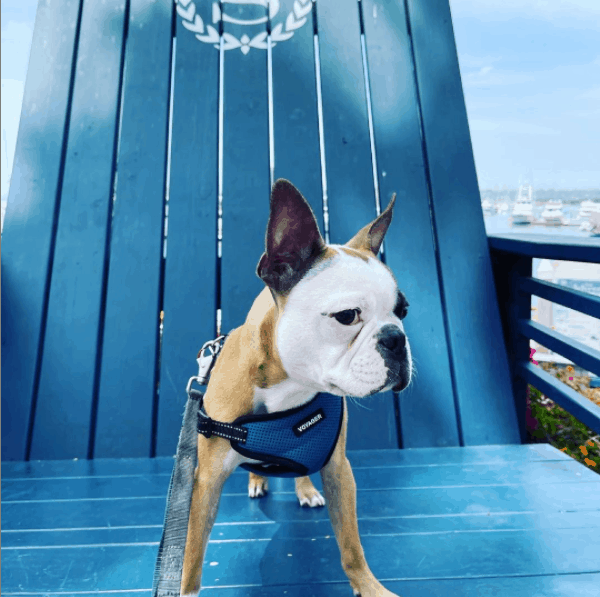
Photo from @parkerbuste
Also, Poodles are generally clean dogs that don’t feel the need to constantly lick themselves. And even though they do suffer from skin problems, as a breed, they only shed dander every twenty days or so (most other breeds shed microscopic particles of dry skin every three or four days).
This means that Poodles are less likely to cause an allergic reaction, not that it is ruled out completely.
Remember that dogs with longer coats may pick up pollen in their coat when out running in woods and meadows. You may not be allergic to dogs, but you might well be allergic to some types of pollen!
So, a hypoallergenic dog isn’t one that is completely allergy-free; it’s one that is relatively less likely to cause an allergic reaction. The trouble is that the term has been used for so long to describe an allergy-free pet that people have become used to it.
Is The Boston Terrier Hypoallergenic?
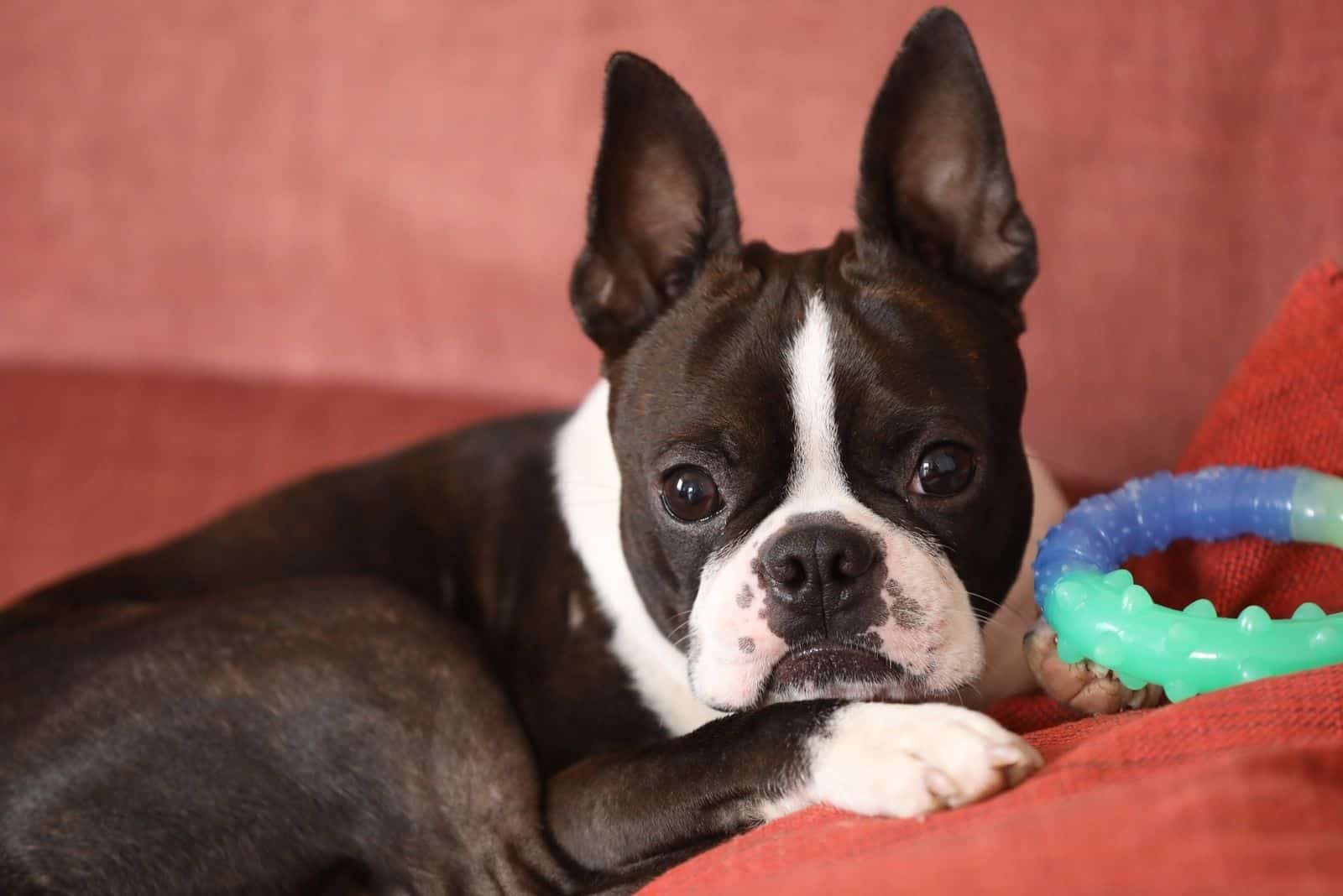
Here’s a little nugget of truth to help us out: no dog is 100% allergy-free. The main dog allergens are found in dander, saliva, and urine.
It’s just that we have less exposure to these proteins in some breeds because of differences in their coat type and the behavior of the breed. Even a completely hairless dog can trigger an allergic reaction!
So, how does that affect the answer to our question, Are Boston Terriers hypoallergenic?
According to the AKC, a hypoallergenic dog is one that sheds minimally and doesn’t produce dander. Our Boston Terrier falls into the former category but fails in the latter! Therefore, by all accounts, they can’t be considered hypoallergenic.
Why Are Boston Terriers Not Hypoallergenic?
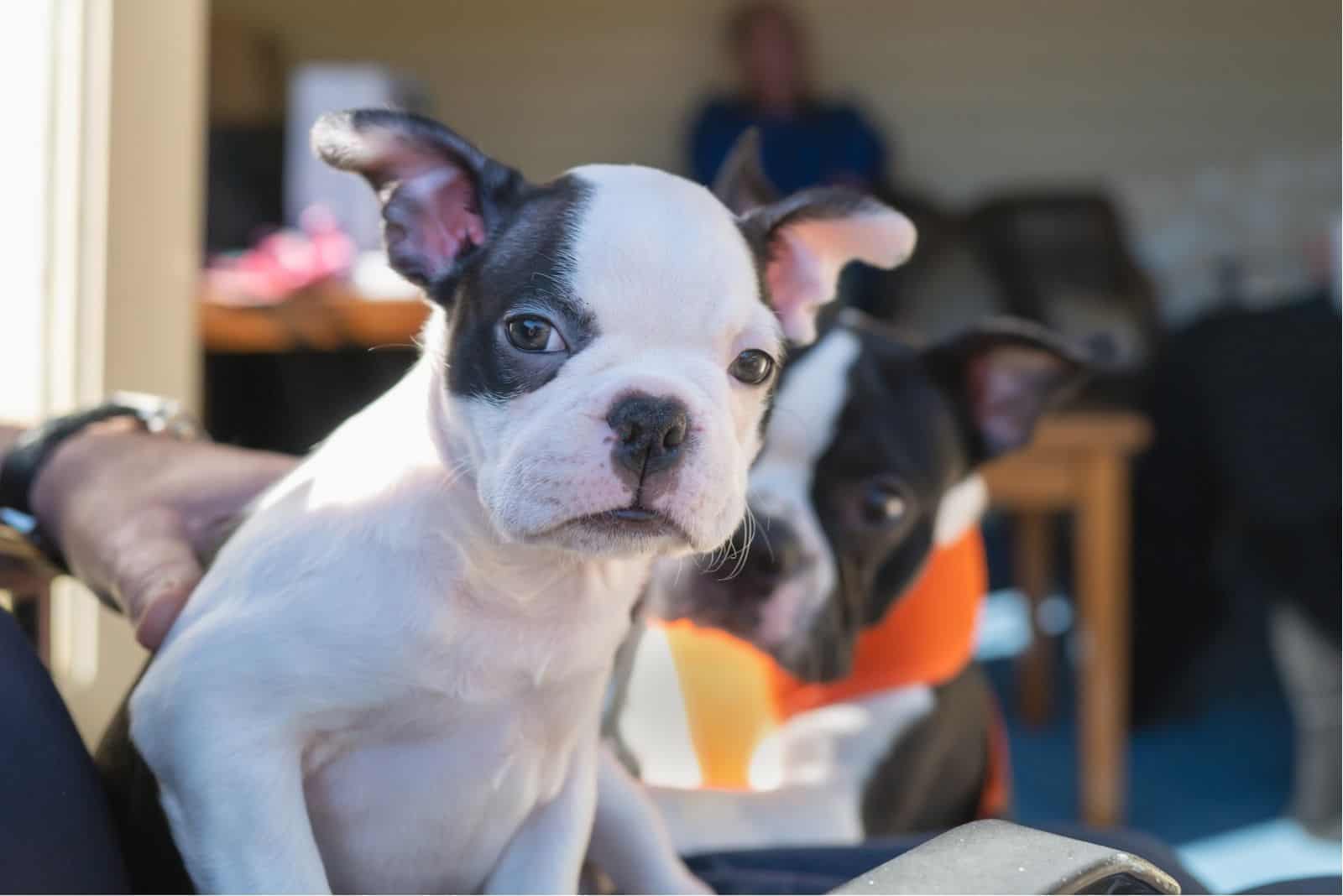
Although they are low-shedders, they produce a fair amount of dog dander that falls off and floats around your home.
What makes the problem worse is that this dog breed suffers from allergies itself! Dogs react differently from humans when it comes to allergies.
They tend not to sneeze, but the dog’s skin becomes dry and itchy. When they scratch at it, the skin flakes away, and deposits can build up on your floors and furniture.
These dogs also have a long list of other health issues due to the breeding process, many of which contribute to skin problems that will increase the chances of dry, flaking skin.
Can You Be Allergic To Boston Terriers?
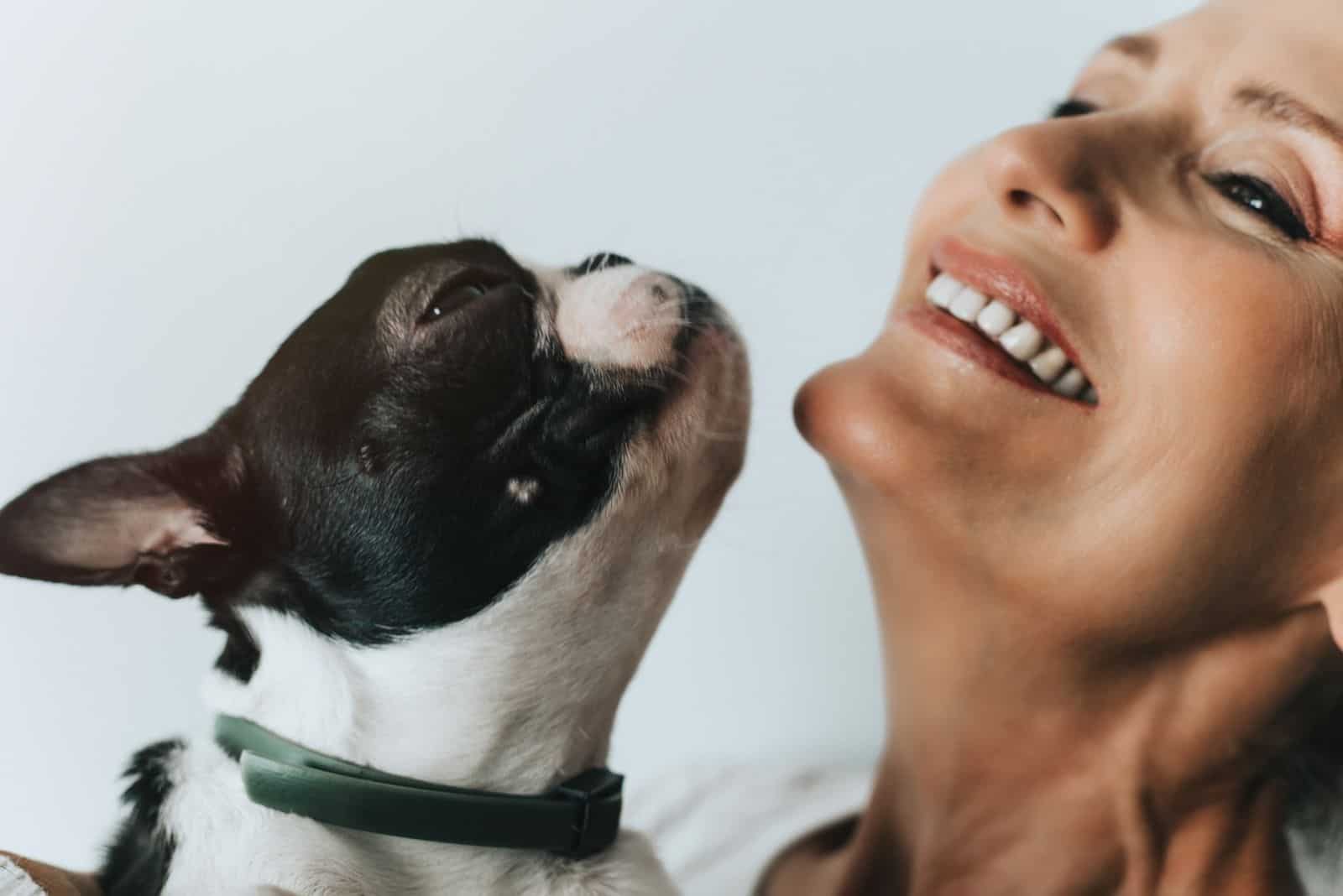
If this seems an odd question, given what we’ve already discovered, we’ve included it here as it’s a question that is frequently asked. The answer is clear: yes, you can be allergic to Boston Terriers.
Or rather, you can be allergic to the proteins present in dog dander, saliva, and urine.
The worrying thing about allergies is that many of us assume that they are predictable. You either have them, or you don’t.
Millions of people have lifelong conditions such as asthma and hay fever. Some of us know to avoid particular things that will trigger a reaction. Food allergies seem to be particularly bad in recent years, but the cause isn’t understood.
What we do now know is that allergies can develop suddenly. The human body can tolerate some allergens for years, but then one day, it decides that a particular one presents a threat.
The immune system will go into overdrive and attack these foreign bodies, even though they are not harmful in any way. It is this reaction to the allergens that causes the problem.
The brain sends out signals telling the body to produce more mucus, which is why your nose runs, and you start sneezing.
Histamine is produced, which gives you red and itchy skin. In extreme cases, the blood vessels become constricted, and the throat can swell, causing breathing difficulties.
So, whether you suffer from pet allergies or not, it’s a good idea to reduce the amount of contact you have with any allergens in case you develop an allergy over time.
What Are Boston Terriers Allergic To?
Ironically enough, your dog might be allergic to you! Among its health issues, the Boston Terrier is known to be prone to allergies. Some dogs, including our American Gentleman, are allergic to human dander.
Aside from this, Boston Terriers are at an increased risk of being allergic to soy products, wheat gluten, and certain food additives. They can also be allergic to dust mites, mold, pollen, perfume, and even smoke.
As well as treating your allergies, there’s a good chance that you’ll be seeking medical advice for your Boston Terrier puppy for their own!
Tips To Avoid Allergic Reactions To Pet Hair
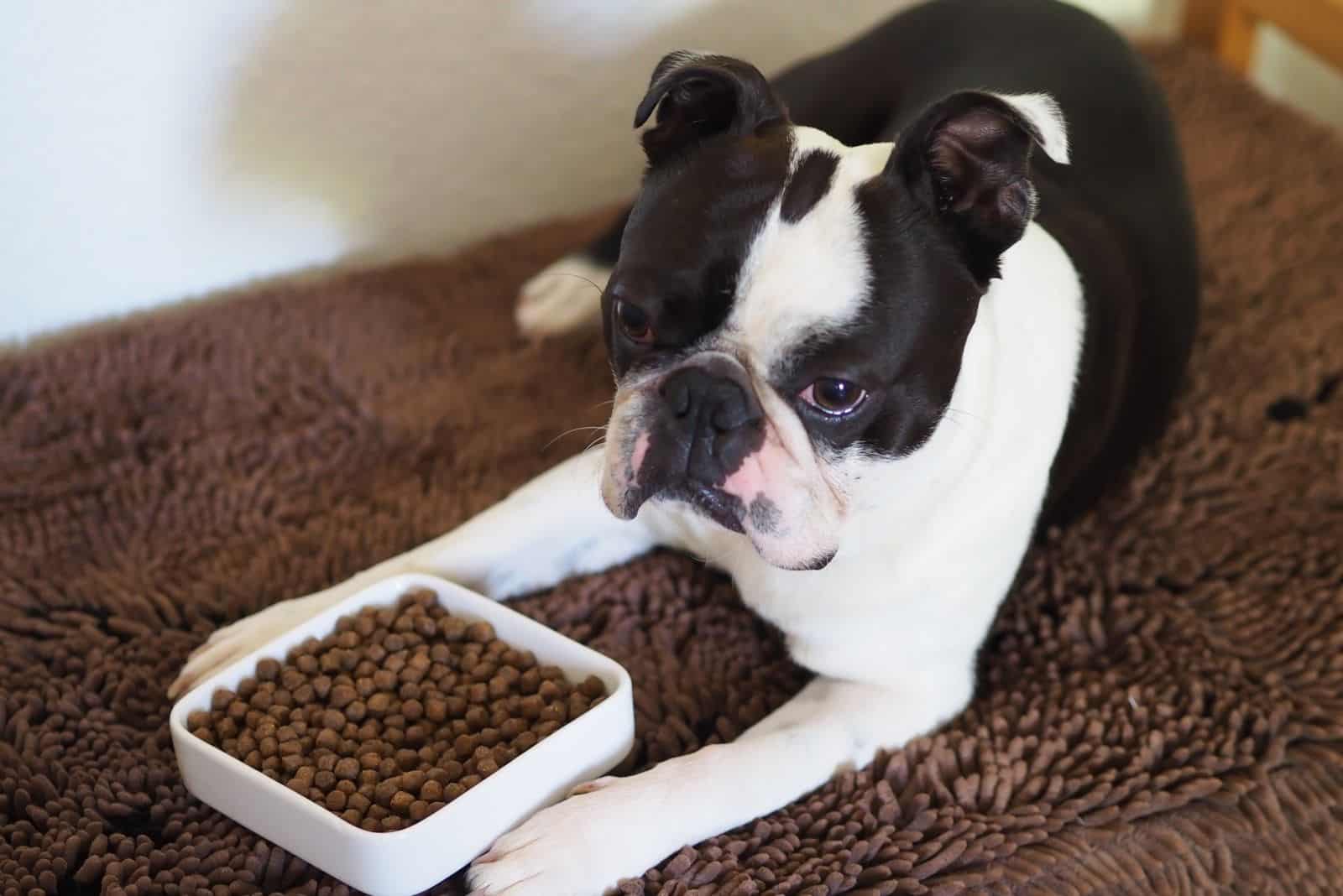
Aside from picking a breed of dog that is not prone to drooling and which doesn’t shed much, there are several ways you can help to limit the chances of being allergic to your pet:
• Feed them only good quality dog food – most allergies that dogs suffer from are caused by food, as mentioned above.
Premium dog food will ensure that your dog stays healthy and will help its immune system function properly. Keep an eye out for any signs of an allergic reaction, and consult your vet, who will advise you on how to manage your dog’s diet. Also, use our Boston Terrier feeding chart for a better insight into this dog’s nutritional needs.
• Invest in a powerful vacuum cleaner – getting rid of any hair and dog dander that falls off is a great way to reduce the risk of coming into contact with allergens. Some brands produce special models made to tackle pet hair.
• Use an air purifier – a high-performance air purifier with a HEPA filter will extract pet dander from the air, which means you won’t be breathing it in.
• Wash laminate floors regularly – dander and hair can get trapped in dust and dirt, so be sure to clean hard floors with a mild detergent. Remember that your dog will be walking here, and any harsh cleaners will soak in through their paw pads.
• Wash their dog bed and blankets regularly – ideally, you should do this once a week to get rid of pet dander. It will also keep them smelling fresh.
• Bathe your dog once a week – be sure to use a high-quality dog shampoo and don’t overdo it, or you will wash away the natural oils that keep the skin and coat healthy.
• Brush your dog regularly – this is one of the best ways to reduce the chances of making contact with allergens. Brush your dog with a grooming mitt or good-quality brush at least once a week or every day during the shedding seasons in spring and fall.
Obviously, you’ll want to do this outdoors in better weather. When it’s cold and wet, use a garage if you have one, or place an old sheet or some newspaper beneath your dog while brushing.
The Final Word
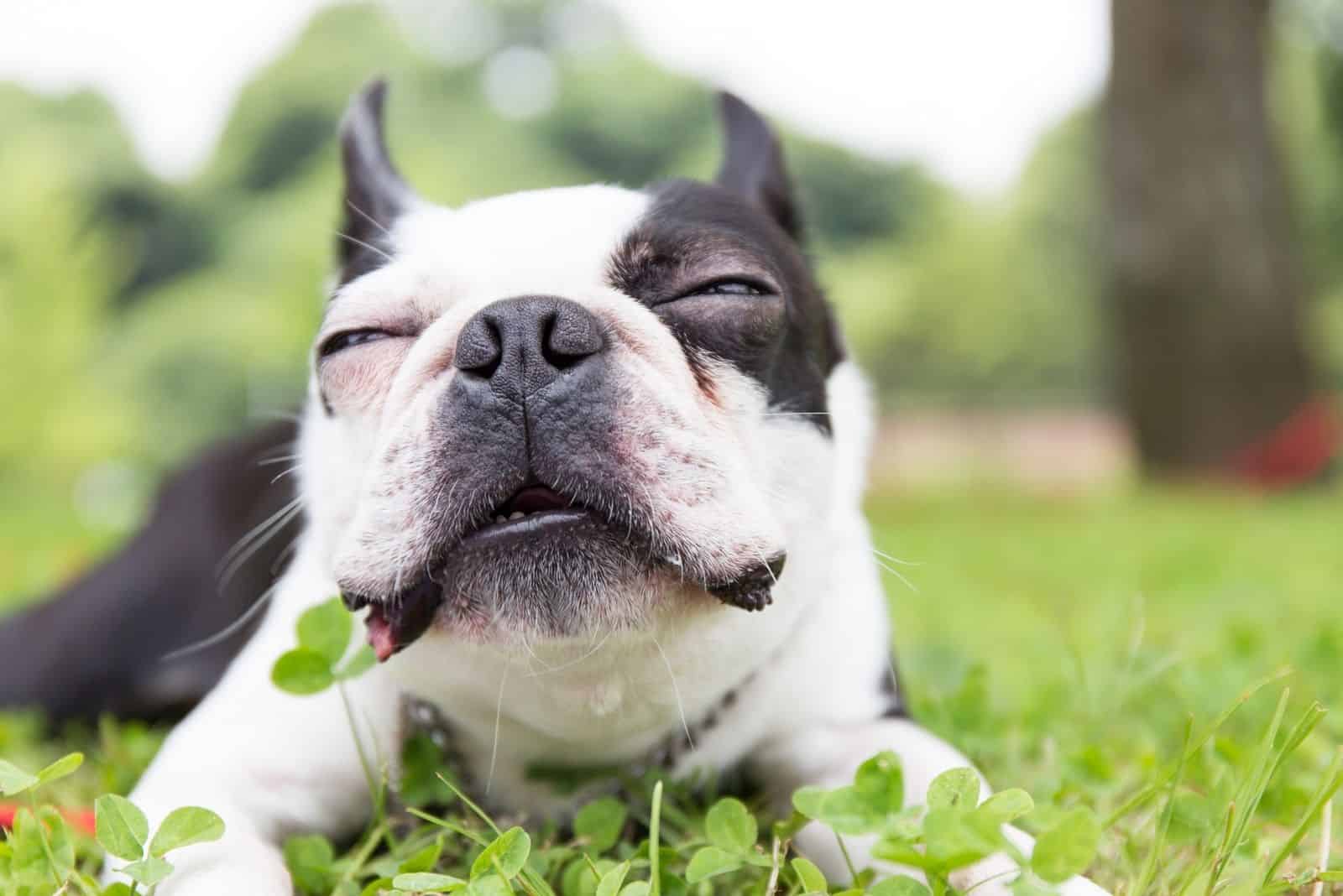
Hopefully, by now, you’ll have a better understanding of the term hypoallergenic. Also, you’ll be able to make a decision as to whether a Boston Terrier is the right doggy friend for you.
If you are still concerned about how much they shed, perhaps you need to look at other small breeds, such as the Yorkshire Terrier or the Schnauzer, that are known to be low-shedders.
Even so, we now know that shedding isn’t the real problem – it’s the proteins in saliva and dander that people are allergic to.
However, if you have chosen the Boston Terrier as your new dog, then the tips listed above will help to alleviate the allergy problem.
At the start, we asked the question, Are Boston Terriers hypoallergenic?
The answer, as we discovered, is no. That doesn’t mean that you’ll definitely have a bad reaction if you are an allergy sufferer; it just means that it is a possibility. Once again, if you follow the tips listed here, you should find that the risk of a reaction is greatly reduced.
In the end, it all comes down to how much you want one of these dogs in your life, how severe the allergy is, and how well you can manage the problem.
Boston Terriers may not be considered the best dogs for allergy sufferers, but they are by no means the worst.
Read Next:
• The Boston Terrier Lifespan: 5 Top Things That Influence It
• 8 Best Boston Terrier Breeders In Florida

